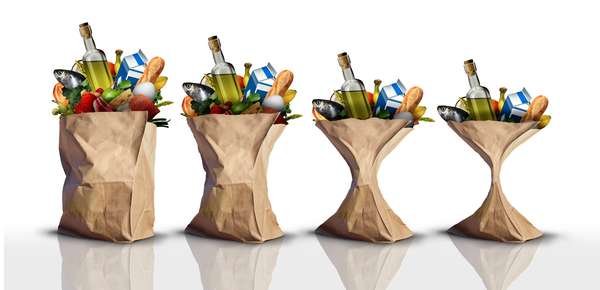Beware of ‘shrinkflation’: How to spot subtle rip-offs at the supermarket before it's too late!
- Replies 43
As we navigate the aisles of our local supermarkets, armed with shopping lists and an eye for bargains, there's a sneaky phenomenon taking a bite out of our budgets—and it's not as obvious as a price hike.
It's called 'shrinkflation', and it's a term that's all too familiar for Australian consumers at this point, especially those who remember when a dollar stretched much further.
Shrinkflation is the process where manufacturers reduce the size or quantity of their products while keeping prices the same, or even increasing them.
This can be a double whammy for shoppers: not only are you getting less for your money, but you might not even notice it's happening.
The consumer group CHOICE has recently shed light on the extent of this issue, which is affecting everything from Easter staples like hot cross buns to everyday items such as breakfast cereals, biscuits, and cleaning products.
With the cost of living already a concern for many, particularly those in their golden years managing on fixed incomes, understanding shrinkflation is more important than ever.

Take the case of hot cross buns—a seasonal favourite. Community Co's traditional and chocolate varieties have seen a reduction of 30 grams (6.3 per cent) in size since last year, with prices rising by 12.5 per cent to $4.50.
This price increase is more than triple January's annual inflation rate of 3.4 per cent.
Metcash, the group behind IGA (which stocks Community Co hot cross buns), cited the change to a new supplier as the reason behind this increase.
‘The price also increased from $4 to $4.50 due to recipe improvement, which included increasing the chocolate chip content from 18 per cent chocolate (cocoa and milk chips) to 20 per cent chocolate (cocoa and dark chips), and the rising cost of goods, including the increase in the cost of flour and chocolate,’ a spokeswoman explained.
‘That being said, our Community Co hot cross buns are part of our Price Match Program which matches the lowest regular shelf price, of Coles and Woolworths on hundreds of everyday products, so the price has come down to $4, so while the pack size has decreased slightly, the price remains the same as last year.’
Breakfast cereals are another battleground. Coles and Woolworths have both been found to reduce the volume of their cereal products without reducing the price.
For example, Coles’ Mighty Grain 495g ($4.50), a product similar to Kellogg's Nutri Grain, was reduced in size by 11.6 per cent—from 560g in October 2022 to 495g in March 2024—yet the price remained the same.
A spokeswoman of Coles claimed that these changes are due to increased production costs.
‘We can assure our customers that we have not profited from the change in pack size of Coles Mighty Grain and Coles Corn Flakes cereals, and that all of the cost price relief has been retained by our supplier, who has experienced increases in the cost of production and raw ingredients,’ she stated.
‘Our supplier let us know it was changing the pack size for its cereal products, both branded and private label, so that it could simplify production and supply chain.’
On the other hand, Woolworths’ Max Charge Cereal 495g ($4.50) was reduced from 560g in September 2023 to 495g in March 2024.
However, according to a Woolworths spokeswoman, their house-branded products were cheaper by 30 per cent compared to similar-branded products.
‘Our suppliers requested the changes in pack sizes,’ she explained.
‘We can confirm that there was no financial benefit to Woolworths by changing the size of these products, as the cost from the supplier to us did not decrease.’
‘On average, these two products are also more affordable than similar branded products,’ she added.
According to data from the Australian Bureau of Statistics, bread and cereal prices experienced a 7.4 per cent increase in the period up to January.
The issue of shrinkflation is impacting biscuits as well, with McVitie's Go Ahead Crispy Slices Forest Fruit 174g ($4.40) items maintaining their price at $4.40 despite shrinking by 20.2 per cent to 174 grams from 218 grams since June 2022.
However, it's not just food items that are shrinking. Cleaning products like Jif’s Power & Shine Bathroom Cleaner 500mL ($4.00) had seen a significant reduction in volume with a substantial price increase.
The cost has risen by 60 per cent, while the volume has decreased by 28.6 per cent from 700mL in May 2022 to 500mL currently—amounting to more than double the price per 100mL.
Community Co, United Biscuits, and Unilever Australia have yet to comment regarding this issue.
Meanwhile, at ALDI, another contentious detail spotted in one of its products has stirred up further discussion about product standards and transparency in the grocery industry.
 Have you noticed products shrinking in size at your local supermarket? Share your experiences in the comments below.
Have you noticed products shrinking in size at your local supermarket? Share your experiences in the comments below.
It's called 'shrinkflation', and it's a term that's all too familiar for Australian consumers at this point, especially those who remember when a dollar stretched much further.
Shrinkflation is the process where manufacturers reduce the size or quantity of their products while keeping prices the same, or even increasing them.
This can be a double whammy for shoppers: not only are you getting less for your money, but you might not even notice it's happening.
The consumer group CHOICE has recently shed light on the extent of this issue, which is affecting everything from Easter staples like hot cross buns to everyday items such as breakfast cereals, biscuits, and cleaning products.
With the cost of living already a concern for many, particularly those in their golden years managing on fixed incomes, understanding shrinkflation is more important than ever.

'Shrinkflation' is when products are sold at a higher or unchanged price, despite reduced sizes. Credits: Shutterstock
Take the case of hot cross buns—a seasonal favourite. Community Co's traditional and chocolate varieties have seen a reduction of 30 grams (6.3 per cent) in size since last year, with prices rising by 12.5 per cent to $4.50.
This price increase is more than triple January's annual inflation rate of 3.4 per cent.
Metcash, the group behind IGA (which stocks Community Co hot cross buns), cited the change to a new supplier as the reason behind this increase.
‘The price also increased from $4 to $4.50 due to recipe improvement, which included increasing the chocolate chip content from 18 per cent chocolate (cocoa and milk chips) to 20 per cent chocolate (cocoa and dark chips), and the rising cost of goods, including the increase in the cost of flour and chocolate,’ a spokeswoman explained.
‘That being said, our Community Co hot cross buns are part of our Price Match Program which matches the lowest regular shelf price, of Coles and Woolworths on hundreds of everyday products, so the price has come down to $4, so while the pack size has decreased slightly, the price remains the same as last year.’
Breakfast cereals are another battleground. Coles and Woolworths have both been found to reduce the volume of their cereal products without reducing the price.
For example, Coles’ Mighty Grain 495g ($4.50), a product similar to Kellogg's Nutri Grain, was reduced in size by 11.6 per cent—from 560g in October 2022 to 495g in March 2024—yet the price remained the same.
A spokeswoman of Coles claimed that these changes are due to increased production costs.
‘We can assure our customers that we have not profited from the change in pack size of Coles Mighty Grain and Coles Corn Flakes cereals, and that all of the cost price relief has been retained by our supplier, who has experienced increases in the cost of production and raw ingredients,’ she stated.
‘Our supplier let us know it was changing the pack size for its cereal products, both branded and private label, so that it could simplify production and supply chain.’
On the other hand, Woolworths’ Max Charge Cereal 495g ($4.50) was reduced from 560g in September 2023 to 495g in March 2024.
However, according to a Woolworths spokeswoman, their house-branded products were cheaper by 30 per cent compared to similar-branded products.
‘Our suppliers requested the changes in pack sizes,’ she explained.
‘We can confirm that there was no financial benefit to Woolworths by changing the size of these products, as the cost from the supplier to us did not decrease.’
‘On average, these two products are also more affordable than similar branded products,’ she added.
According to data from the Australian Bureau of Statistics, bread and cereal prices experienced a 7.4 per cent increase in the period up to January.
The issue of shrinkflation is impacting biscuits as well, with McVitie's Go Ahead Crispy Slices Forest Fruit 174g ($4.40) items maintaining their price at $4.40 despite shrinking by 20.2 per cent to 174 grams from 218 grams since June 2022.
However, it's not just food items that are shrinking. Cleaning products like Jif’s Power & Shine Bathroom Cleaner 500mL ($4.00) had seen a significant reduction in volume with a substantial price increase.
The cost has risen by 60 per cent, while the volume has decreased by 28.6 per cent from 700mL in May 2022 to 500mL currently—amounting to more than double the price per 100mL.
Community Co, United Biscuits, and Unilever Australia have yet to comment regarding this issue.
Meanwhile, at ALDI, another contentious detail spotted in one of its products has stirred up further discussion about product standards and transparency in the grocery industry.
Key Takeaways
- Consumer group CHOICE highlighted the 'shrinkflation' issue, where supermarkets sell products at higher or unchanged prices, despite reduced quantities in the package.
- Notable examples included hot cross buns and breakfast cereals, which have seen a reduction in size along with an increase in price, affecting value for money for consumers.
- Supermarkets such as Coles and Woolworths faced questions about these practices, with spokespeople citing increased production costs as a reason for the changes in pack sizes.
- The phenomenon is widespread, affecting various products, including biscuits and cleaning products, with some items shrinking in size while the price remains the same or increases.







